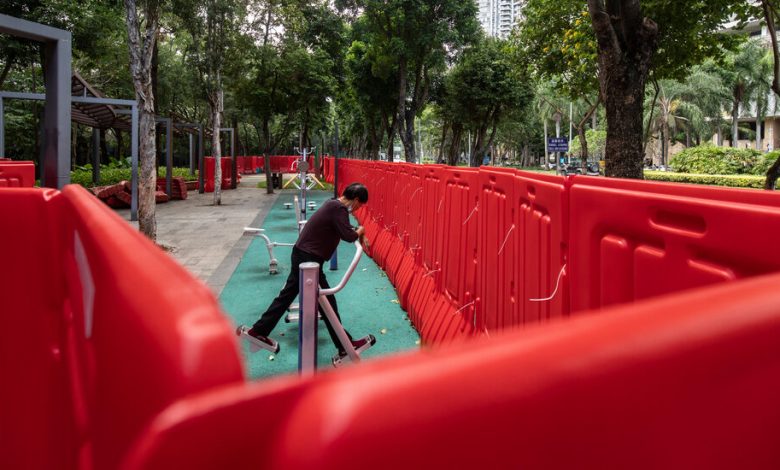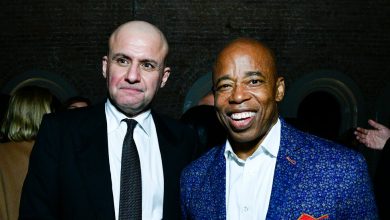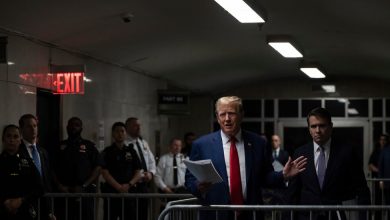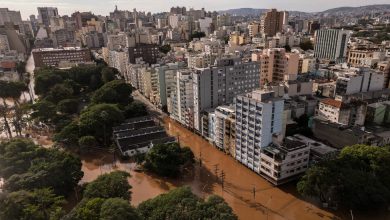Your Monday Briefing: The Social Cost of ‘Zero Covid’


Strict lockdowns have made ordinary life next to impossible for many in China.Credit…Qilai Shen for The New York Times
Has “zero Covid” eroded China’s social contract?
President Xi Jinping’s “zero Covid” policy has rewritten the implicit bargain that people in China will get stability and comfort in exchange for limitations on political freedoms.
Limitations still abound, with little stability. Nearly 530 million people — almost 40 percent of the population — were under some form of lockdown in late November, according to one estimate. People have gone hungry, or died because of delayed medical care, and legions have endured work interruptions or layoffs.
The result has been growing disillusionment and the most widespread protests China has seen since the Tiananmen Square demonstrations in 1989.
Quotable: “It used to be, for most people you didn’t really feel the state in your daily life too much,” said one law professor. “Now, of course, the state is everywhere.”
Outlook: If China can limit the impact of future outbreaks as it loosens restrictions, the sense of shared grievance could sputter — but Xi’s fixation on control could remain, along with his expanded security apparatus.
The end of Iran’s morality police
Iran has abolished the morality police after months of protests ignited by the death of a young woman, Mahsa Amini, who was being held by the force for supposedly violating the country’s strict Islamic dress laws.
The decision, which was announced by Iran’s attorney general in remarks carried on state media, appeared to be a significant victory for the protest movement that has consumed Iran since Amini’s death in September.
The movement has amounted to one of the biggest challenges in decades to Iran’s system of authoritarian clerical rule. Security forces have responded with a crackdown that has left hundreds dead and about 14,000 arrested, according to rights groups.
Understand the Protests in China
- The Toll of ‘Zero Covid’: The protests come as President Xi Jinping’s harsh pandemic policies have hurt businesses and strangled growth. The Daily looks at what the demonstrations could mean for Mr. Xi.
- A Roar of Discontent: The protests have awoken a tradition of dissent that had seemed spent after 10 years under Mr. Xi. The effects may far outlast the street clashes.
- Tracking Protesters: The authorities in China are using the country’s all-seeing surveillance apparatus to track, intimidate and detain those who marched in the protests.
- Outmatching the Censors: Days after the initial protests, videos of chants and confrontations were visible on the Chinese internet. Experts say the sheer volume of clips likely overwhelmed China’s army of censors.
The absence of any official government statement on disbanding the force left some questioning where the policy stood exactly. But by late Sunday the authorities had not issued a denial on state media outlets, either.
Context: The morality police’s primary role was to make sure women covered their bodies in long, loose clothing and their hair with a head scarf or hijab. Enforcement has always been uneven and arbitrary.
Results: The attorney general said on Thursday that the authorities were reviewing the head scarf regulations and would issue a decision within 15 days, but protesters are now pursuing more than dress law reforms.
Russia vows to defy oil price cap
After the Group of 7 nations agreed on Friday to impose a price cap on Russian oil, Moscow insisted it would not sell oil that is subject to the limit, adding to questions of whether the plan will succeed in slowing Russia’s war effort in Ukraine.
The Group of 7 hoped that capping the price of Russian crude at $60 a barrel would dent the Kremlin’s finances while still keeping enough Russian oil on the market to avoid a global price shock. The $60-per-barrel figure was a compromise that was close to what major buyers of Russian oil currently pay.
Russia threatened to work only with countries that met market prices for its oil, even if that meant curbing production. Even before Russia’s announcement, questions loomed about whether the plan could be enforced, and President Volodymyr Zelensky of Ukraine worried that the price limit was inadequate to stanch Russian aggression.
In other war news, a Ukrainian resident of occupied Kherson returned a lost, dazed pilot to the Russians. Ukraine charged him with treason.
THE LATEST NEWS
Asia Pacific
-
A legal dispute between a K-pop band and its management highlights what some experts see as wider problems of abuse in the industry.
-
Rahul Gandhi, the scion of a once-mighty political dynasty in India, is walking 2,000 miles in an attempt to resuscitate his foundering political party.
-
Reuters reports that the Islamic State claimed responsibility for an attack on Pakistan’s embassy in Kabul, Afghanistan, on Friday.
-
A volcano erupted on Indonesia’s most populated island, prompting evacuations, The Associated Press reported.
Around the World
-
A deadly landslide on the Italian island of Ischia led to scrutiny of buildings that may have been built illegally.
-
A phony climate foundation helped German officials collaborate with the Kremlin-owned energy company Gazprom to complete a direct gas pipeline between Russia and Germany.
-
One passenger died and four others were injured when a rogue wave struck a cruise ship en route to the Antarctic.
The World Cup
-
The U.S. was eliminated by the Netherlands, 3-1.
-
France defeated Poland, 3-1. Kylian Mbappé scored twice, and Olivier Giroud’s first-half goal made him France’s all-time leading scorer.
-
Lionel Messi’s first goal in an elimination game helped Argentina triumph over Australia, 2-1.
-
See three stunning goals from the World Cup, frozen in time.
Other Big Stories
-
Senator Raphael Warnock and his challenger, Herschel Walker, face off in Georgia’s runoff election on Tuesday.
-
Lachlan Murdoch, the chief executive of the Fox Corporation, is expected to be deposed on Monday as part of a $1.6 billion defamation lawsuit against Fox News.
-
Three weeks after four University of Idaho students were stabbed to death in their bedrooms by an unknown assailant, residents of the college town are terrified.
A Morning Read
Mauna Loa, the largest active volcano in the world, is “one of the most well-instrumented volcanoes in the United States,” according to one volcanologist.
Its eruption, the first in decades, provides a tantalizing opportunity to understand the inner workings of the exhalation of a massive mountain.
Lives Lived
Noodle the pug became a TikTok star, and a sort of mood ring, through the simple act of rising from or collapsing into his dog bed.
HIGHER EDUCATION
Trying to appear “less Asian” for college
Dominant at chess? Talented at piano? Proficient in Chinese?
Many Asian American applicants to top colleges downplay activities that could be seen as stereotypically “Asian,” sometimes at the suggestion of college admissions consultants. Asian Americans are a hugely diverse group, but in high-stakes college admissions many Asian American students are acutely aware of what not to be, and the rumor that students can appear “too Asian” has hardened into a kind of received wisdom.
And a lawsuit seems to have confirmed what many Asian American teenagers have quietly thought. In October, the Supreme Court heard arguments in a lawsuit that accused Harvard University of systematically discriminating against Asian American applicants. The plaintiffs said that, compared with other racial groups, applicants of Asian descent consistently received a lower “personal rating” — a subjective score for traits like self-confidence, likability and kindness.
Harvard University and supporters of affirmative action have argued that there is no such thing as a penalty for Asians, that race is one factor among many used to evaluate applicants and that the number of admitted Asian American applicants has steadily increased for decades.
PLAY, WATCH, EAT
What to Drink
Make a splash at holiday parties with mezcal royale punch or a smoky alcohol-free punch.
What to Read
In “Four Treasures of the Sky,” Jenny Tinghui Zhang uses “earthy and lyric” prose to tell the story of a Chinese girl trafficked to the American West in the 19th century, Jennifer Egan writes in her review.
What to Watch
Davy Chou’s film “Return to Seoul,” which follows a reckless 25-year-old adoptee’s return to South Korea, is a “startling and uneasy wonder.”
How to Decorate
The Times visited top interior designers to see their holiday decorations.
Now Time to Play
Play the Mini Crossword, and here’s a clue: Sister of Kendall Jenner (five letters).
Here are the Wordle and the Spelling Bee.
You can find all our puzzles here.
That’s all for Monday. Have a great week. — Dan
P.S. The word “naslah,” the local name for the blade of a traditional dagger from Oman, appeared for the first time in The Times yesterday.
Start your week with this narrated long read about how Noah Baumbach made “White Noise” a timely disaster movie, and here’s Friday’s edition of “The Daily,” on who will pay for climate change.
You can reach Dan and the team at [email protected].




